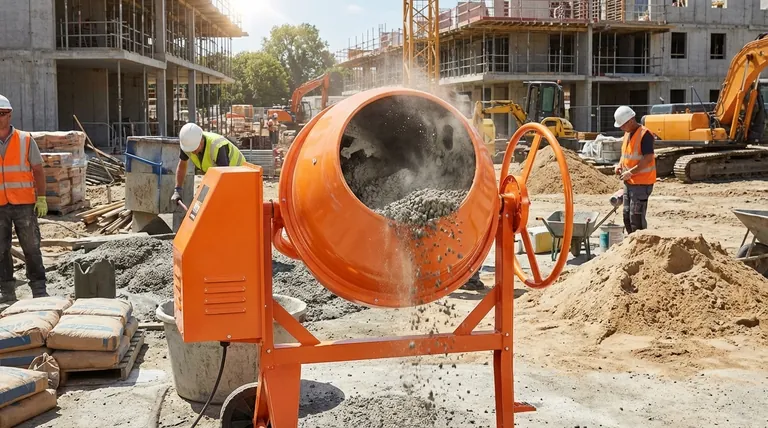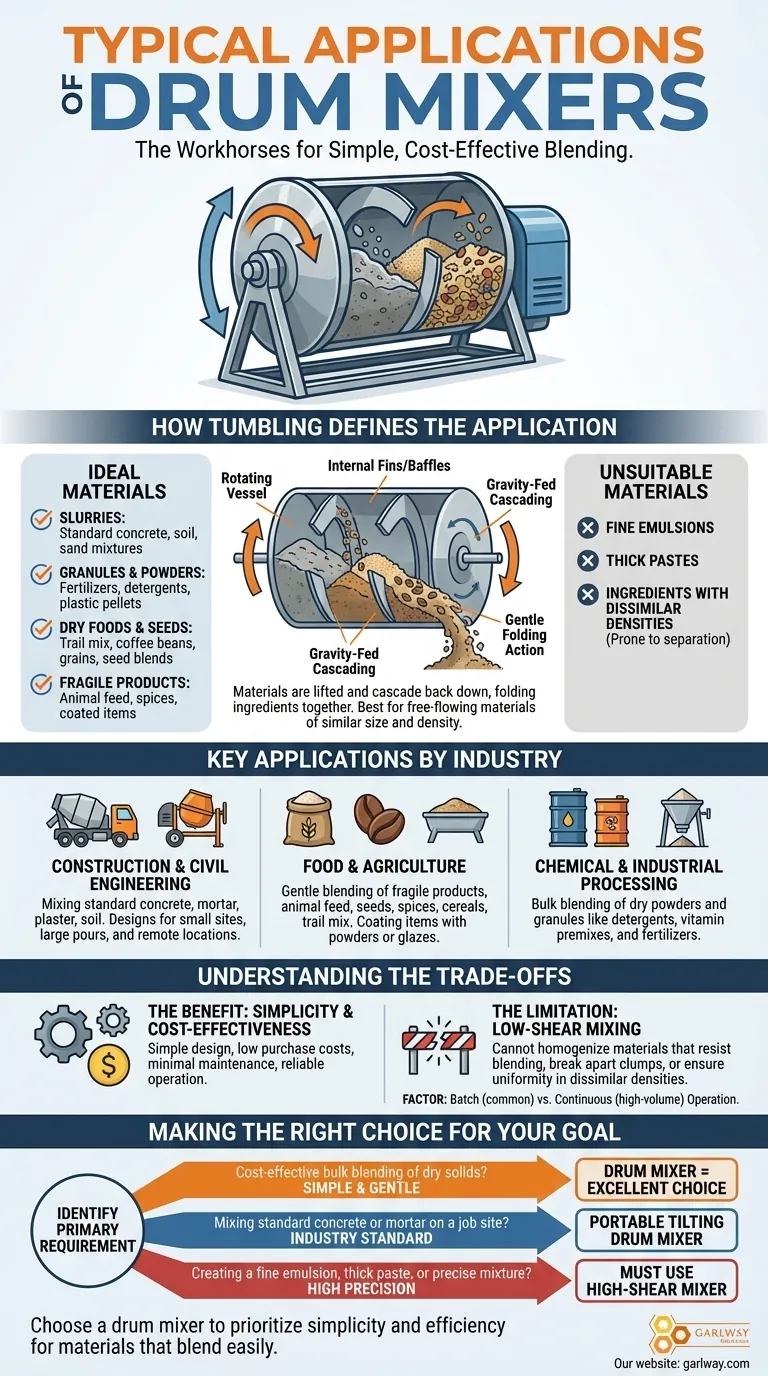At their core, drum mixers are the workhorses for simple blending. They are widely used for applications ranging from mixing concrete on construction sites to blending trail mix in food production. Their common purpose is to combine materials that blend easily through a gentle tumbling action, without requiring high-intensity force.
The key takeaway is that drum mixers excel at cost-effective, bulk blending of materials that are already similar in size and density. Their limitation is a lack of high-shear force, making them unsuitable for creating complex emulsions or mixing materials that resist blending.

The Principle: How Tumbling Defines the Application
The function of a drum mixer dictates its use cases. Understanding this simple mechanism makes it clear why it's the right tool for some jobs and the wrong one for others.
How a Drum Mixer Works
A drum mixer is fundamentally a rotating vessel. As the drum turns, internal fins or baffles lift the material up the side. Gravity then causes the material to cascade or tumble back down.
This process repeats continuously, folding the ingredients together. This gentle action is perfect for many materials but lacks the force to break down clumps or blend thick pastes.
Ideal Materials for Drum Mixing
Materials that are free-flowing and of similar particle size are a perfect match. The tumbling action is sufficient to distribute them evenly.
Common examples include:
- Slurries: Standard concrete, soil, and sand mixtures.
- Granules & Powders: Fertilizers, detergents, and plastic pellets.
- Dry Foods & Seeds: Trail mix, coffee beans, grains, and seed blends.
Unsuitable Materials for Drum Mixing
The mixer's gentle nature is its primary limitation. It cannot apply the intense mechanical shear needed to combine dissimilar materials.
Avoid using a drum mixer for tasks like creating fine emulsions, mixing thick pastes, or blending ingredients with vastly different densities, which are prone to separating.
Key Applications by Industry
While concrete mixing is the most recognized application, the versatility of the drum mixer extends across numerous sectors.
Construction and Civil Engineering
This is the drum mixer's most common environment. They are used for mixing standard concrete, mortar, plaster, and soil.
Different designs serve specific needs: portable mixers for small sites, truck mixers for large pours, and rough-terrain mixers for remote locations.
Food and Agriculture
The gentle tumbling action is ideal for fragile products. It effectively blends ingredients without crushing or damaging them.
Applications include combining animal feed, grass seed, spices, cereals, trail mix, and coffee beans. It's also used for coating items, like candies or nuts, with powders or glazes.
Chemical and Industrial Processing
For bulk blending of dry powders and granules, drum mixers are a cost-effective solution.
They are frequently used for mixing detergents, vitamin and mineral premixes, and fertilizers where the goal is a simple, uniform distribution of ingredients.
Understanding the Trade-offs
Choosing a drum mixer involves recognizing its strengths and accepting its inherent limitations.
The Benefit: Simplicity and Cost-Effectiveness
Drum mixers have a simple design with few moving parts. This translates directly to lower initial purchase costs, minimal maintenance requirements, and reliable operation. They are highly efficient for the simple blending tasks they are designed for.
The Limitation: Low-Shear Mixing
This is the most critical trade-off. The lack of forceful mixing means a drum mixer cannot homogenize materials that resist blending. It struggles to break apart agglomerates (clumps) or ensure a perfectly uniform mix of materials with different densities.
The Factor: Batch vs. Continuous Operation
Most common drum mixers, especially in construction, are batch mixers. They mix one load at a time, which is then fully discharged. This is simple and effective for defined jobs.
Larger industrial operations may use continuous drum mixers, where material is constantly fed in one end and discharged from the other, enabling high-volume production.
Making the Right Choice for Your Goal
Selecting the correct mixer starts with identifying the primary requirement of your mixing process.
- If your primary focus is cost-effective bulk blending of dry solids: A drum mixer is an excellent choice for its simplicity and gentle action.
- If your primary focus is mixing standard concrete or mortar on a job site: A portable tilting drum mixer is the industry standard for this task.
- If your primary focus is creating a fine emulsion, a thick paste, or a highly precise mixture: You must use a high-shear mixer, as a drum mixer will not achieve the required result.
Ultimately, choosing a drum mixer is a decision to prioritize simplicity and efficiency for materials that blend without a fight.
Summary Table:
| Attribute | Drum Mixer |
|---|---|
| Best For | Simple blending of similar-sized materials |
| Ideal Materials | Concrete, powders, granules, dry foods, seeds |
| Key Benefit | Cost-effective, gentle tumbling action |
| Main Limitation | Cannot create emulsions or mix thick pastes |
| Common Industries | Construction, Food & Agriculture, Chemicals |
Need a reliable mixer for your construction or industrial project? At GARLWAY, we specialize in high-performance construction machinery, including durable concrete mixers and batching plants designed for contractors and construction companies worldwide. Our equipment ensures efficient, cost-effective blending for your specific needs. Contact our experts today to find the perfect solution for your project!
Visual Guide

Related Products
- Concrete Cement Mixer Machine Drum Mixer for Construction
- Ready Mixer Machine for Construction Ready Mix Machinery
- Shaft Mixer Machine for Cement and Regular Concrete Mixing
- Commercial Construction Mixer Machine for Soil Cement Mixing Concrete
- Auto Concrete Cement Mixer Machine New
People Also Ask
- What is the best oil for a cement mixer? Choose the Right Oil for Your Climate
- What are the disadvantages of ready mixed concrete? Navigate Logistical & Cost Risks
- What else can you use a cement mixer for? Unlock Its Versatility Beyond Concrete
- Can you mix self leveling concrete in a cement mixer? Avoid Costly Flooring Mistakes
- Can you mix mortar in a cement mixer? Avoid weak joints and project failure.















